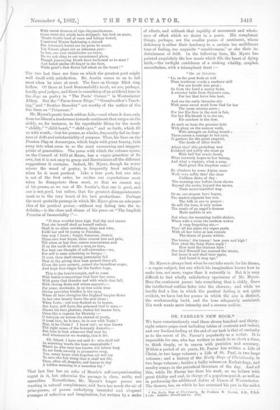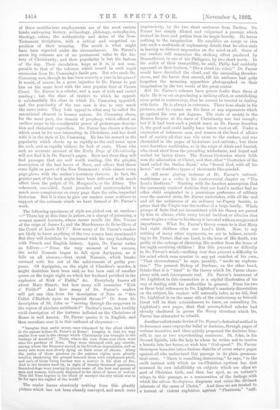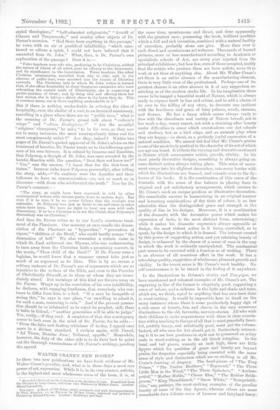DR. FARRAR'S NEW BOOK.*
WE have conscientiously read these eleven hundred and thirty- eight octavo pages (not including tables of contents and index), and our liveliest feeling at the end of our task is that of curiosity- as to the secret of Dr. Farrar's popularity as a writer. It is, impossible for one, who has written so much in so short a time, to think deeply, or to reason with precision and accuracy. Vithin a period of six years, Dr. Farrar has written a Life of Christ, in two large volumes ; a Life of St. Paul, in two large. volumes ; and a history of the Darby Days of Christianity, in two largo volumes ; besides a bulky volume on Eschatology, and sundry essays in the periodical literature of the day. And all this, while Dr. Farrar has done his work, as we believe with great fidelity and zeal, in charge of a populous parish, as well as in performing the additional duties of Canon of Westminster. The themes, too, on which he has exercised his pen in the midst.
m. Rsly Days of Cltri4iani'y. By Frederic W. Farrar, D.D., I.R.S. 2 vole. London: Caesell and Co. 1882,
of these multifarious employments are of the most various kinds, embracing history, archseology, philology, metaphysics, theology, ethics, the authenticity and dates of the New- Testament Scriptures, with a critical and exegetical ex- position of their meaning. The result is what might have been expected under the circumstances. Dr. Farrar's seven big volumes are of no permanent value to the his- tory of Christianity, and their popularity is but the fashion -of the day. Their circulation, large as it is, is not com- parable to that of the volumes which issued in such rapid succession from Dr. Cumming's facile pen. But who reads Dr. Cumming now, though he has been scarcely a year in his grave? It would, of course, be a gross injustice to Dr. Farrar to put him on the same level with the once popular Seer of Crown Court. Dr. Farrar is a scholar, and a man of wide and varied reading ; but the class of readers to which he appeals is substantially the class to which Dr. Cumming appealed, and the popularity of the two men is due to very much the same cause. They both appeal to what may be called the sensational element in human nature. Dr. Cumming chose, for the most part, the domain of prophecy, which offered an -endless scope to his considerable power of picturesque descrip- tion and rhetorical exposition. Dr. Farrar has chosen a theme which must be for ever interesting to Christians, and has dealt with it in the style of Dr. Cumming. He has his reward in the popularity which shoots up as rapidly as the seed sown upon the rock, and as rapidly withers for lack of roots. Those who seek an accurate account of the Early Days of Christianity, will not find it in Dr. Farrar's pages. Here and there they will find passages that are well worth reading, like the graphic, description of the last hours of Nero, and others that throw some light on parts of the New Testament ; while almost every page glows with the author's hortatory rhetoric. In fact, the greater part of the book might have been delivered with much -effect from the pulpit of St. Margaret's, or the Abbey. The *vehement, one-sided, fluent preacher and controversialist is much more conspicuous on every page than the calm, impartial historian. But it is time to give our readers some evidence in :eupport of the estimate which we have formed of Dr. Farrar's work.
The following specimens of style are picked out at random : —" There lay at this time in prison, on a charge of poisoning, a woman named Locusta, whose career recalls the Mrs. Turner of the reign of James I., and the Marchioness de Brinvilliers of
the Court of Louis XIV." How many of Dr. Farrar's readers are likely to know anything of the two women here mentioned ? But they will doubtless be impressed with his easy familiarity with French and English history. Again, Dr. Farrar writes as follows :—" From the very moment of her success, the awful Nemesis began to fall upon Agrippina, as it falls on all sinners,—that worst Nemesis, which breaks crowned with fire out of the achievement of guilty pur- poses. Of Agrippina, on the night of Claudius's murder, it might doubtless have been said, as has been said of another queen on the tragic night on which her husband perished in the .explosion of Kirk o' Fields," &c. Everybody knows all about Mary Stuart ; but how many will remember "Kirk o' Fields P" And how many of Dr. Farrar's. readers will get any idea from his description of Nero as "this Collot d'Herbois upon an imperial throne P" Or from his description of St. John as "moving through the empyrean in the region of absolute antithesis P" Tacitus's terse, but terribly vivid description of the tortures inflicted on the Christians of Rome is well known. Dr. Farrar quotes it in English, and then moralises over it in this outburst of eloquence :—
"Imagine that awful scene, once witnessed by the silent obelisk in the square before St. Peter's at Rome ! Imagine it, that we may realise how vast is the change which Christianity has wrought in the feelings of mankind There, where the vast dome now rises, were
• onco the gardens of Nero. They were thronged with gay crowds, among whom the Emperor moved, in his frivolous degradation, and on every side were men slowly dying on their cross of shame. Along the paths of those gardens on the autumn nights were ghastly torches, blackening the ground beneath them with sulphurous pitch, and each of those living torches was a martyr in his shirt of fire. And in the theatre hard by, in sight of twenty thousand spectators, famished dogs were tearing, to pieces some of the best and purest of men and women, hideously disguised in the skins of bears or wolves. Thus did Nero baptise in the blood of martyrs the city which was to be for ages the capital of the world."
The reader learns absolutely nothing from this ghastly picture which has not been already conveyed, and much more
impressively, by the two short sentences from Tacitus. Dr. Farrar has simply diluted and vulgarised a passage which derived its force and pathos from its tragic brevity. He leaves nothing to the imagination. He amplifies an image or idea into such a multitude of explanatory details that he often ends in leaving no distinct impression on the mind at all. Some of our readers will remember the striking effect produced by Demosthenes, in one of his Philippics, by two short words. In the midst of their tranquillity, he said, Philip had suddenly appeared on their horizon, "like a cloud (Ls vipos)." Dr. Farrar would have described the cloud, and the succeeding thunder- storm, and the havoc that ensued, till his audience had quite forgotten the menacing apparition photographed on their imagination by the two words of the great orator.
But Dr. Farrar's volumes have graver faults than those of style. He is so set on producing a striking effect, or establishing some point in controversy, that he cannot be trusted in dealing with facts. He is always in extremes. There is no shade in his pictures, and he cannot see the force of any arguments which go against his own pet dogmas. The state of society in the Roman Empire at the dawn of Christianity was bad enough ; but if it had been such a putrid mass as Dr. Farrar describes it, the good seed could hardly have taken root at all. Under a succession of infamous men and women at the head of affairs and of society all that was vile came to the surface, and was chronicled in the pages of historians and satirists ; but there were doubtless multitudes, as in the reign of Ahab and Jezebel, who stood aloof from the prevailing wickedness, and hoped and waited for better times. The Roman Centurion whose faith won the admiration of Christ, and that other" Centurion of the band called the Italian Band," who "feared God, with all his house," are doubtless types of thousands like-minded.
A still more glaring instance of Dr. Farrar's untrust- worthiness as a critic is his controversial chapter on "The Lord's Brethren." Starting with the baseless assumption that the commonly received doctrine that our Lord's mother had no other child originated in a pernicious preference of celibacy over the married state, Dr. Farrar undertakes, with all the zeal and all the unfairness of an ordinary no-Popery fanatic, to prove that the Virgin was the mother of a large family. Whole groups of facts that are inconsistent with his theory are passed by him in silence, while every trivial incident or allusion that seems to give a colour to his theory is invested with an exaggerated importance. What Dr. Farrar's theory comes to is that Mary had eight children after our Lord's birth. Now, to say nothing of many other arguments, we are to believe, accord- ing to Dr. Farrar, that our Lord, in the hour of His death, was guilty of the outrage of divorcing His mother from the home of her eight surviving children But this presents no difficulty to Dr. Farrar's mind,—nothing ever does present a difficulty to his mind which runs counter to any pet crotchet of his own.. "That circumstance," he says, jauntily, "needs no explana- tion." The present Bishop of Durham, on the other hand, thinks that it is "fatal" to the theory which Dr. Farrar cham- pions with such intemperate zeal. Dr. Farrar's treatment of Dr. Lightfoot in this connection is a capital illustration of his way of dealing with his authorities in general. From his two or three brief references to Dr. Lightfoot's masterly dissertation on the subject, his readers will naturally infer, as we did, that Dr. Lightfoot is on the same side of the controversy as himself. Great will be their astonishment to learn, on consulting Dr. Lightfoot's own pages, that that accomplished scholar had already shattered in pieces the flimsy structure which Dr. Farrar has attempted to rebuild.
Anotherunfortunate device of Dr. Farrar's rhetorical method is to denounce some unpopular belief or doctrine, through pages of verbose invective, and then quietly propound the doctrine him- self, in one or two unpretending sentences. St. John, in his Second Epistle, bids the lady to whom he writes not to receive a heretic into her house, or wish him "God-speed." Dr. Farrar thereupon launches into a furious diatribe of seven octavo pages against all who understand this passage in its plain, gramma- tical sense. "There is something distressiug," he says, "in the swift instinct with which an un-Christian egotism has first assumed its own infallibility on subjects which are often no part of Christian faith, and then has sped, as on vulture's wings, to this passage, as a consecration of the feelings with which the odium theologicum disgraces and ruins the divinest interests of the cause of Christ." And then we are treated to a torrent of violent expletives against "Pharisees," " self-
styled theologians," "half-educated religionists," "Arnold of Citeaux and Torquemada," and sundry other objects of Dr. Farrar's aversion. "Had there been anything in this passage," he vows, with an air of pontifical infallibility, "which sanc- tioned so odious a spirit, I could not have believed that it emanated from St. John." What, then, is Dr. Farrar's own explanation of the passage? Here it is :—
" False teachers were rife who, professing to ho Christians, robbed the nature of Christ, of all which gave its efficacy to the Atonement, and its significance to the Incarnation. These teachers, like other Christian missionaries, travelled from city to city, and, in the absence of public inns, wore received into the houses of Christian converts. The Christian lady to whom St. John writes is warned that, if she offers hospitality to these dangerous emissaries who were subverting the central truth of Christianity, she is expressing a public sanction of them ; and, by doing this and offering them her best wishes, she is taking a direct share in the harm they do. This is common sense, nor is there anything uncharitable in it."
But if there is nothing uncharitable in refusing the rites of hospitality, even the shelter of a roof, to an heretical missionary, travelling in a place where there are no "public inns," whatis the meaning of Dr. Farrar's grand talk about "vulture's wings " and " oditon theoZogiewn, ?" " Are the so-called religious' champions," he asks, "to be for over, as they now are in many instances, the most unscrupulously hitter and the most conspicuously unfair P" Are they, indeed Within two pages of Dr. Farrar's quoted approval of St. John's advice on the treatment of heretics, Dr. Farrar treats us to the following speci- men of his own fairness. It is related by Ireninus and Eusebius, that Polyearp, a disciple of St. John, was once accosted by the heretic Marcion with the question, " Dost then not know me ?" "Yes," was the answer, "I know thee for the first-born of Satan." Tremens (who knew 13)1yearp personally), after telling the story, adds,—" So cautious were the Apostles and their followers to have no communication—no, not so much as in discourse—with those who adulterated, the truth." Now for Dr. Farrar's comment :—
" The story, as might have been expected, is told by other ecclesiastical writers with intense gusto, down to modern days. But even if it be true, it by no means follows that the example was estimable. St. Polyearp was just as liable to Bin and error as other saints have been. We have no right to treat any man with rude discourtesy. If to be a Christian is to act like Christ; then Polycarp's discourtesy was un-Christian."
And then Dr. Farrar refers us to our Lord's courteous treat- ment of the Pharisees. Our memory at once recalls the denun- ciation of the Pharisees as " hypocrites," " generation of vipers," "children of the Devil," who could hardly escape "the damnation of hell." We also remember a certain scene in which St. Paul addressed one Elymas, who was endeavouring to turn away from the Christian faith a promising convert, in the words, "Thou child of the Devil!" If Dr. Farrar were a logician, he would know that a reasoner cannot take just as much of an argument as he likes. This is by no means a solitary instance of Dr. Farrar's use of arguments which are as injurious to the writers of the Bible, and even to the Founder of Christianity Himself, as to those at whom they are imme- diately aimed. But warnings of this kind are thrown away on Dr. Farrar. Wrapt up in the conviction of his own infallibility, he declares, with engaging frankness, that everybody who ven- tures to differ from him, is a fool. "If a man be incapable of seeing this," he says in one place, "or unwilling to admit it, for such a man, reasoning is vain." And if the present genera- tion should be so infatuated as to reject its prophet, still, there is balm in Gilead,—" another generation will be able to judge."
verily,—if they read. A suspicion of that dire contingency seems to lurk even in the mind of Dr. Farrar, for he adds :— "From the false and fleeting- criticisms a to-day, I appeal once more to a diviner standard. I exclaim again, with Pascal, "Ad Tuurn, Domino Jesu!, Tribunal, appello." Meanwhile, however, the duty of the other side is to do their best to point
out the thorough unsoundness of Dr. Farrar's writings, pending the appeal.




































 Previous page
Previous page